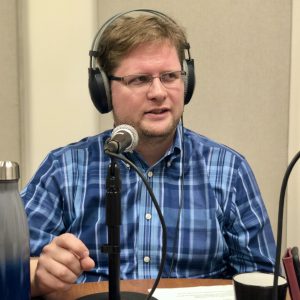Investigative journalist Playford: ‘Ask hard questions. And to go out and see things for yourself. And to stay alive to file your copy.’
By Ella Sullivan, Northwood High

May 30 was set to be a normal day in the office at the Tampa Bay Times. Adam Playford, the Tampa Bay Times deputy editor of investigative reporting, had picked up the weekend editor shift. A shift every editor at the Tampa Bay Times has to take a couple times a year to help put out the Sunday paper, which consists of longer projects and less breaking news.
May 30 was already going to be “kind of crazy,” Playford said during a webinar with high school journalists at the NCSMA Summer Institute because of Space X’s Launch America, the first launch of American astronauts on American ground to the International Space Station since 2011.
May 30 was also Tampa Bay’s first protest over the death of George Floyd at the hands of the police in Minneapolis.
“When I went to bed the night before, I had gotten some notes saying there was going to be at least one protest the next day,” Playford said. “And when I woke up, I was reading on my phone all the very dramatic things that were happening around the country and suddenly it went from one protest to three.”
Playford knew that around the country, some protests had started peacefully and ended in conflict. He started looking for extra staff members who were comfortable working in a situation that could turn violent.
He started reviewing safety protocol, which he had never had to do anything with before but vaguely knew. Playford had heard, for instance, of the Miami Herald’s rule on covering hurricanes: “Dead reporters can’t file a copy.”
Eventually, all but one of the protests finished. The one protest still happening quickly became dangerous. People in the crowd began lighting fireworks, throwing liquid at police officers and smashing police car windows and storefronts, according to Playford’s reporter at the scene. Later, people in the crowd reported the police firing at them with rubber bullets and buildings being set on fire.
Playford had minutes to go before the Sunday paper had to be printed, but had to add a paragraph to the end of the front-page story explaining the changed direction of the protest. Over the next few weeks, these protests brought up questions not only about racial relations, but also the media’s role.
“How do we conduct ourselves going forward as journalists?” Playford asked. “There’s a rising debate in newsrooms all over the country about where the right line is between journalism and objectivity and fairness. And what is journalism and what is advocacy? And what responsibilities do we have to call out injustice vs. to report on it more neutrally?”
These questions are being asked all over the country and have been being asked for a long time. America’s media has long been distrusted by many, peaking with President Trump’s common use of the term “fake news.” The media has been struggling with telling their stories, feeling compelled by both neutrality and morality.
“I think our strongest work is when we struggle really hard to understand even people we deeply disagree with, and I think that’s really important in these really emotional times,” Playford said. “And I also think our strongest work calls for us to call out injustice.”
Playford has long worked with difficult issues, including police officers who abused their power, faulty voting machines, and local corruption. His investigative reporting on police officers culminated in “For Their Eyes Only: Police misconduct hidden from public by secrecy law, weak oversight.”
This article, written with Sandra Peddie, exposed the secrecy allowed by New York’s Civil Rights Law 50-a. Peddie and Playford said that law “makes any record used to judge an officer’s performance confidential.”
“When we ran that story in 2014, it got a lot of attention on Long Island. It did not make huge change in the world,” Playford said. “But that law, 50-a, was repealed a couple weeks ago.”
Playford does not think of himself as an activist. He thinks of himself as a journalist. So how do journalists be journalists without being activists?
Playford believes this is possible when journalists “pick topics where it is possible for people to do better and where change is possible.” Playford feels journalists have been successful in this when they reveal “something people didn’t know or didn’t realize, and the world improves from that knowledge.”
Playford urged young journalists to “ask hard questions. And to go out and see things for yourself. And to stay alive to file your copy. And also not to be afraid of uncomfortable conversations, because I think all of us, all across the country, that’s what we need.”
